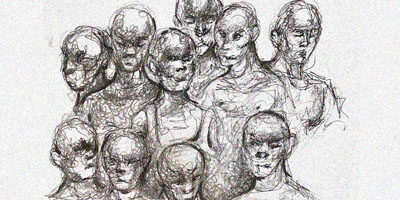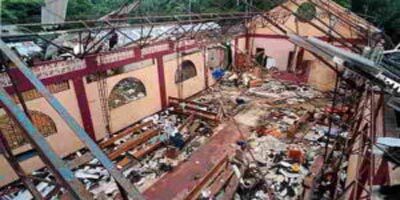Listen to the companion podcast here
Alwazeer Mudather is a young person who works to provide aid amidst Sudan’s ongoing war. Before leaving Sudan, he worked in Bahri and Khartoum, the early epicenters of the conflict’s violence, in one of the networks of local volunteers called Emergency Response Rooms (ERRs), where he would secure food and water, provide critical health services, evacuate citizens, negotiate release for detained civilians, and deliver burial services.
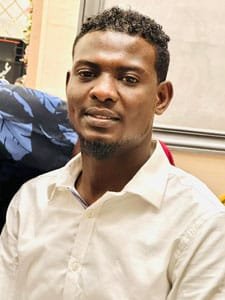
Mudather described to me how ERR efforts began in Khartoum as the war intensified and the paramilitary Rapid Support Forces (RSF) established a dominant presence in the city. Government-affiliated personnel fled the capital in fear of being targeted.
Soon after, as clashes between the warring factions began, there were no prospects of government services and institutional support for civilians caught in the crossfire. Sudan’s healthcare system suffered near total collapse in the early stages of the conflict.
Sudan’s ERRs engage in civilian-led mutual aid. These informal networks, organized by locality, rapidly mobilize to answer calls for humanitarian assistance. Many ERRs have established makeshift facilities, including soup kitchens and clinics, to provide essential services.
Since the war began on April 15, 2023, Sudan has been facing an unprecedented humanitarian crisis. Thus far, there have been 16,000 reported deaths, though the actual death toll is projected to be much higher. Over 15 million people are facing famine and over 9 million people have been displaced.
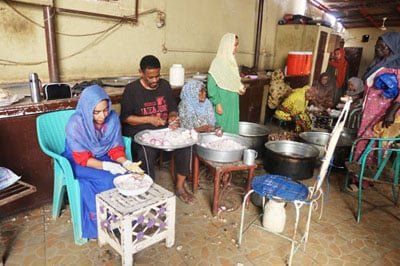
In this dire context, ERRs work to fill the void left by international aid organizations that have suspended or ceased their operations. As the crisis deepens, ERRs implement a person-centered response reflective of the kinship and mutual care inherent to Sudanese culture.
Cause of the conflict
The 2018-2019 Sudanese Revolution ousted 30-year dictator Omar Al-Bashir, leading to the establishment of the Transitional Sovereignty Council. This interim government was intended to alternate between military and civilian leadership through a two-year transitionary period toward democracy. However, in October 2021, General Abdel Fattah al-Burhan, leader of the Sudanese Armed Forces (SAF), orchestrated a coup and dissolved the council. Mohamed Hamdan “Hemedti” Dagalo, the leader of the RSF and al-Burhan’s deputy, played an instrumental role.
In December 2022, facing international pressure, Al-Burhan and Hemedti signed a framework agreement to allow for a civilian-led government and consolidate the SAF and RSF under a new democratic administration. However, tensions grew between the two as they both sought to maintain their political influence, feeling threatened by the agreement. Their power struggle quickly escalated into the outbreak of the current war.
Both al-Burhan and Hemedti have ties to the former Islamist regime that the revolution sought to dismantle. Consequently, neither warring faction enjoys widespread popular support, and experts characterize the conflict as a counter-revolutionary war. Hope for a democratic transition towards civilian rule has diminished as these generals compete for control over the country’s territory and resources.
The emergence of the ERRs
Mudather’s Bahri ERR emerged from Sudanese resistance committees, an origin that most ERRs share. The ERRs that are emerging independently or from resistance committees are adopting similar tactics and infrastructure.
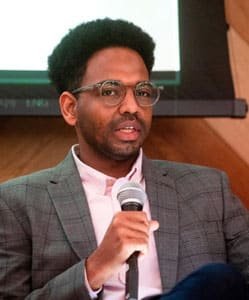
The resistance committees form a decentralized network of activists and represent a “bottom-up democratization” effort, says Hamid Kalafallah, a Sudanese researcher and policy analyst. Established in 2013, these committees played a crucial role in the revolution and continue to mobilize against Sudan’s authoritarian military rule.
Mudather described to me how the Bahri ERR network consists of forty-eight committees of emergency responders. Each of these committees has two leading recruiters that Mudather identified as having ties to resistance committees. These recruiters and emergency responders use existing resistance committee networks, which are crucial to delivering immediate aid.
How ERRs are engaging in acts of resistance and participatory democracy
The development of mutual aid in Sudan embodies the revolutionary and democratic sentiments propagated by resistance committees, despite the grim realities of war.
Many ERRs hold open meetings with local civilians in their neighborhoods, allowing people to provide input on the kind of aid they would like to receive and how they would like to receive it. Khalafallah emphasizes that this approach grants the local population agency, which contrasts the often-impersonal approach of international aid agencies.
Khalafallah says that as ERRs engage in acts of mutual aid, they are also demonstrating acts of resistance. By offering alternative conceptions of governance, ERRs challenge the country’s authoritarian stronghold. This resistance inspires visions of a future free from the divisions and polarization incited by the warring factions.
ERRs’ capacity for inspiring hope within local communities is part of what keeps the country’s spirit of resistance alive. ERRs hold community gatherings, events, and forms of entertainment as a means of maintaining some semblance of normalcy amidst widespread devastation.
However, by assuming roles traditionally held by the state, ERRs are targets for both the RSF and SAF. Each of the warring parties seeks to co-opt ERRs to legitimize their agendas. When they are unsuccessful, they resort to violence to eliminate the threat of ERRs.
As each of the warring parties strive to be the de facto government of Sudan, subjugation of civil society is a result. Despite these pressures, ERRs resist submitting to the warring factions, committing to good governance and empowering civilians through principles of transparency, participation, and equality that counter authoritarian rule.
Mudather and his colleagues face harassment and threats of violence for their ERR operations. The young people who are providing life-saving aid are consistently at risk of being detained by militants on both sides of the war. Sometimes, ERR members will negotiate the release of their colleagues; other times, missing members cannot be located at all. Mudather said that he has lost several of his colleagues to the violence.
Accusations of espionage are frequently wielded against ERR members. Khalafallah says that it is likely difficult for either side to “fathom that these are people who are actually risking their lives only to save their own people, not because they are being paid by anyone.” As a result, ERR members are forced to operate with a great deal of care, anonymity, and at risk to their lives.
Despite these difficulties, the selfless actions of ERR members highlight the complementary relationship between Sudanese culture and mutual aid, a sentiment echoed by all my interviewees. My conversation with Mudather, despite being newly acquainted, felt like speaking with extended family. Kinship and generosity, elements integral to Sudanese culture, were present in every aspect of ERR operations that he detailed. This shared heritage reaffirmed that ERR relief efforts are not only personal and transparent but also a genuine act of care rooted in our cultural values.
The absence of the international community
Many Sudanese on the ground and abroad continue to ask: Why is there little international attention on the world’s largest humanitarian crisis, and why is the intervention of major aid agencies so limited?
The Sudan Solidarity Collective (SSC) is one response to the global community’s low level of fundraising and advocacy due to its lack of awareness and reluctance to acknowledge the crisis. Formed by four community activists and students at the University of Toronto in response to the war, the SCC has since grown to encompass multiple activists across Canada supporting grassroots aid initiatives in areas of intense violence, including funding for ERRs through its Sudan Solidarity Fund.
Domestic and diasporic Sudanese communities criticize prominent news outlets for neglecting to highlight the local voices on the ground –the individuals who can most accurately characterize what is taking place. An SSC member, who asked not to be identified since they work closely with the ERRs, told me that there is a growing frustration with mainstream media’s depiction of the conflict as a civil war.
Framing the violence as a civil war masks its anti-revolutionary intent and the reality of Sudanese civil society. The insinuation that sizable portions of the population have a vested interest in either military agendum is inaccurate and dangerous. This misconception marginalizes the Sudanese’s widespread mobilization and activism, enabling the warring military generals to exploit misguided attention and legitimize their agendas.
Mudather is frustrated with mainstream media repeatedly ignoring the courage and sacrifice of emergency responders, and the obfuscation of civil society’s role in the conflict that makes it difficult for the work of the ERRs to gain global recognition.
The SSC has engaged in educational campaigns in addition to raising funds for ERRs. As a representative of the SSC told me, “No people will flourish and reach their potential by having their voices decentralized.”
ERRs are operating under an abundance of institutional barriers that transcend Sudan’s borders. Despite their efforts, they do not have the means to adequately address the ongoing humanitarian crisis, and maintain their ongoing operations through fundraising efforts facilitated by social media.
Mudather says that the Bahri ERR acquires donations both domestically and from abroad. The SSC has raised hundreds of dollars for ERRs, which of course is nowhere near the support that is urgently required.
The SSC also faces a massive barrier to getting those donations to Sudan, since there are instances of interceptions and ERR members are often unable to access formal banking channels to withdraw money. These issues are exacerbated by the sanctions on the Sudanese pound and the lack of guidance by Canadian banks.
Making organizational efforts more strenuous, there is an internet blackout in Sudan instigated by the warring parties. Not only does this make it difficult to document the atrocities taking place, but it periodically inhibits ERR members from communicating with each other and with organizations like the SSC.
How ERRs are challenging the international aid paradigm
The emergence of ERRs exposes inefficiencies within the international aid system.
The bureaucratic structure of formal aid organizations makes allocating resources to local communities a strenuous process. When international aid agencies do engage with ERRs, they often overlook and dismiss the local work, and seek to change their fundamental operations.
These agencies can overburden ERRs with conditions, by requiring detailed reports for accountability and subjecting them to lengthy wait times for funding. Khalafallah described how ERRs challenge this system by being accountable to their communities rather than expecting aid recipients to be accountable. The SSC representative says that those on the ground “want the international community to be involved in this current crisis, but not at the cost of local voices.”
ERRs prioritize humanizing and including aid recipients throughout their aid administration, a practice often absent in formal aid organizations which can have bureaucratic procedures that are a bit paternalistic. Despite having limited resources and relief training, Khalafallah maintains that ERRs are more efficient than formal agencies with “multi-million dollar budgets, big logistics, security and administration teams.”
Juxtaposing the difficulty mobilizing funds from major humanitarian organizations, Mudather says that the focus is on donations through unconventional channels, such as advocacy networks and social media groups.
Khalafallah says that international aid agencies tend to “romanticize” the idea of mutual aid. While some major humanitarian agencies acknowledge and applaud the work of the ERRs, they often do so aspirationally, implying that they lack the means to engage in similar efforts.
ERRs reveal a divide between the perceptions formal aid by way of global agencies versus more informal community-based support. Khalafallah described how civilian emergency responders are not granted the level of protection in the conflict that formal aid agencies have. He argues that warring factions would most likely face global sanctions if they targeted the operations of formal aid agencies, yet that is the reality that ERR workers, who already struggle with food and water insecurity, exhaustion, displacement and grief. are subjected to daily.
For those interested in donating to the Sudan Solidarity Collective and learning about their initiatives, you can visit its website here and get updated on activities on Instagram (@sudansolidaritycollective).

